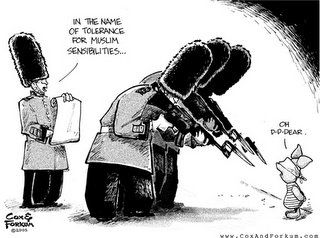
A QUARTER of the public regards Islam as a threat to the British way of life, according to a poll for The Times and ITV News.
The survey suggests that the gulf of understanding and empathy between Britain’s Muslim and non-Muslim communities is mutual and more than a third of British Muslims (36 per cent) believe that British values threaten the Islamic way of life.
The greatest social difference between British Muslims and the rest of British society is over the wearing of Islamic dress in schools. Three quarters of Muslims (76 per cent) think that pupils should be free to wear religious dress whatever a school’s uniform policy, but only two fifths (42 per cent) of the general population agree.
Commentators expressed concern at this picture of a Muslim community at loggerheads with the greater population over their differing cultures. David Dabydeen, Professor of Cultural Studies at Warwick University, said that the finding on the wearing of religious dress in schools was particularly revealing. "I think that aspects of Islam are so backward they are practically medieval, particularly when it comes to attitudes towards sexuality and gender," he said.
Professor Dabydeen also asked why the Muslim community, according to the results, felt threatened by mainstream society. "For Muslims to feel threatened is ridiculous," he said. "It is not in any sense an anti-Muslim issue. This is a plural society that has tolerated many different cultures, and I see very little evidence of mosques being burnt down or attacked."
Sir Iqbal Sacranie, a former secretary-general of the Muslim Council of Britain, said that the issue of religious dress in school was one of fundamental freedom. It was highlighted this year when Shabina Begum, 17, a schoolgirl from Luton, was refused permission to wear a full-length Islamic gown in class.
"Many Muslims do feel strongly about the issue of the hijab, but that is because they see it as an issue of freedom of choice," he said. "If a pupil wishes to wear a particular item, such as the hijab, it can easily become part of a school’s uniform, and accommodate the wishes of pupils of any faith."
Despite these divides, the poll also suggests a remarkable level of agreement between Britain’s Muslim and non-Muslim communities. Two thirds of Muslims admit that their community needs to do more to integrate with British society, almost as many as the three quarters (74 per cent) of all Britons who say the same. More than nine in ten Muslims (92 per cent) say that their community makes a valuable contribution to British society, a view shared by most of the general population (59 per cent).
Nearly as many of the population at large (54 per cent) as Muslims (57 per cent) find public displays of drunkenness unacceptable. Slightly more Muslims (29 per cent) than the general public (21 per cent) say the same about women wearing low-cut tops and short skirts.
Half the general population (51 per cent) believes that Islam treats women as if they are inferior to men but a third of British Muslims (36 per cent) think that the values of British society degrade women.
Simon Mundy, the director of the Centre for the Cultural Environment at King’s College London said: "Citizens, the general public, have proved over the last year to be infinitely more tolerant and less hysterical than the Government has. The way people talk to others around them who are different is considerably more understanding and liberal than the Government has proved to be."
Shahid Malik, Labour MP for Dewsbury, agreed. "This is really Neanderthal, instinctive stuff, based on prejudice not on a knowledge of each other’s cultures," he said.
Populus interviewed 1,131 Muslim adults and 1,005 adults from the general population in early June
Click here to see the Muslim poll in full
No comments:
Post a Comment